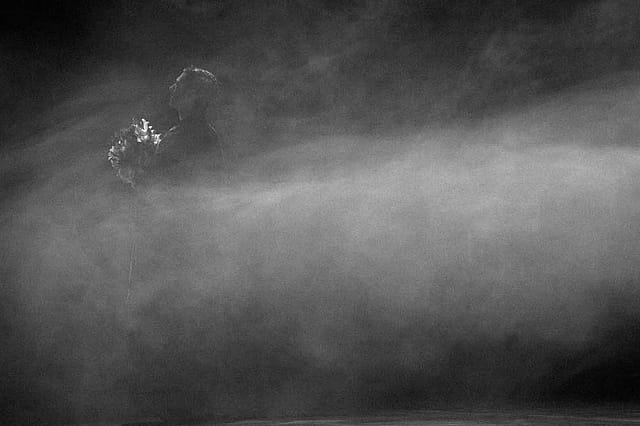The Bliss of Dying

Scarcely a month after marriage, Indian couples are asked if they have any "good news " ( euphemism for pregnancy) and if not just yet, when can it be expected. With an alarmingly booming population, Indians love the idea of children. Birth, even pre-birth is celebrated here.
Sage Rishyashringa was persuaded to conduct the "Puthrakaamayashti" yajna to help king Dasharatha's barren wives become fecund. Not only was there a desire for a preferably male child (sigh),
the quality of the offspring was also of major concern. It was the birth of none less than a Lord Rama and his valourous half-brothers that the brilliant sage managed, with his colossal spiritual powers.
Many rituals and myths are connected with the protection of expectant mothers. Prayers to ward off evil forces from affecting the nascent baby, the tying of a protective amulet on the pregnant mother, a taboo from going out after dusk etc are all enforced even now. The would-be mother is instructed to touch her expanding belly and recite the Manthra of "Achyuthaananda Govinda " a one thousand and eight times, daily. This was to invoke Maha Vishnu, the protector in the Hindu Trinity to ensure that no harm befell the embryo. Near the Temples supermarket town of Kumbhakonam in Tamil Nadu, there is the shrine of Shri Garbharakshaambika, or the Goddess who protects the foetus. People also throng there with tiny wooden cradles, as a sure fire ritual to end long years of barrenness.
Openomics 2026: Continuity and Conviction
06 Feb 2026 - Vol 04 | Issue 57
The performance state at its peak
In the Hindu pantheon of a 330 million divinities, there is a dark and powerful God to whom no altar is kept. Yet, every living has no choice but to worship at His altar, at the end of life. And this, of course is the implacable God of Death. Death is a guarantee (probably the only one?) for all species. That we will die one day, is an absolute given. Just as we celebrate an yearly anniversary of our birth, we blissfully pass our future date of death, each year.
Simply put, cessation of life as we know it, is death. It is a stage that transcends the semi-shut down of the merciful sleep. In ancient Indian texts, like the Garuda Purana, there are three definite components that bring about death. People use the nouns of Yama (the God of Death) and Kaalan (the vernacular way of referring to Death) interchangeably.
Yet the process of dying is initiated by Yama. Of referred to as Yama Dharma. He has the role of a king. It is He who computes the Karma balance of a living being. The good and bad actions, the carry over karma, spilling over from previous births are all perfectly tallied by Him. His job is that of a meticulous Charterd Accountant of lives. This balance sheet of his is handed over to Kaalan.
As the name Kaalan signifies, He has everything to do with Time. The aayus of a human being is calculated by certain methods of astrology as the approximate time of conception, the time when the crown of a womb–leaving baby is seen first, to the time when the baby is fully out of the mother's body, to the exact time the umbilical cord is snipped off. With induced delivery, Caeserean sections etc being freely adopted, an auspicious time of birth for the fully developed embryo is a request that many gynecologists get!
Looking at Yama's log of activity, Kaalan decides the time of recall of the soul from any particular body. There are five kinds of potential death possibilities. Yoga Mrithyu is when a person inadvertently accompanies another whose time of death has arrived. Losing life in a common hazardous sports activity, accidents etc are an example of this. Roga Mrithyu is when a disease is so rampant in a body that disgusted, the soul opts to leave. Apa Mrithyu is Death due to sudden jhatka moment, when a portal between two planes of existence, open up and the soul slips away through this crevice. Akaala Mrithyu is death at a young age, where the normal actions within an average lifespan is left incomplete. Kaala Mrithyu is death arriving at the perfect time of existence.
Astrology gives five chances at death, in keeping with bodies made out of the five Elements. Once the karmic files are tallied by Yama and the time of exit is fixed by Kaalan, the actual execution of death is carried out by Mrithyu. Mrithyu is sometimes portrayed as a beautiful woman who is blind (to avoid the scenes of misery when a loved one is taken away ) as well as deaf (to miss out on the wails of the ones left behind). Insulated from exposure to feelings, Mrithyu is able to efficiently recall souls from the realm of living, to that of death.
Life is a mixture of great beauty and an equal measure of ugliness. Even though feared and often unwelcomed, it is indeed blissful (for the ones who leave) death that makes life much more than an endless repetition of nourishment, sleeping, working, enjoying, reproducing and greeting day after day of mindless activity that life would inevitably slip into.
